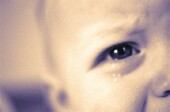
MONDAY, Oct. 11 (HealthDay News) — Newborn babies who have jaundice may be at higher risk of developing autism later on, new research suggests, but other experts said far more research needs to be done before a cause-and-effect relationship is proven.
Researchers in Denmark analyzed information from national registries that included all Danish children born between 1994 and 2004, nearly 734,000 children.
Babies who developed serious jaundice in the days after birth were 67 percent more likely to be diagnosed with autism later on. Babies with jaundice were also more likely to develop other types of “psychological development” delays, according to the study.
When the statistics were broken down further, the researchers found the heightened autism risk only among jaundiced children born in the fall and winter (between October and March) or whose mothers had given birth before. Those children had a two to three times greater chance of developing autism.
“It’s an interesting finding that should be followed up with more mechanistic studies,” said Alycia Halladay, director of research for environmental sciences at Autism Speaks. Halladay was not involved with the study.
There was no apparent association between jaundice and autism in first-born children or those born in the spring and summer (between April and September), according to the study, which was published online Oct. 11 in Pediatrics and will appear in the November print issue of the journal.
The study authors said they compensated for factors such as birth weight that could affect jaundice risk. Preterm infants are at higher risk of jaundice.
Jaundice is the most common condition in newborns requiring medical attention or readmission to the hospital, according to background information in the study.
It occurs when bilirubin, a byproduct of the breakdown of red blood cells, builds up, giving the skin and whites of the eyes a yellowish tinge. Bilirubin is typically taken care of by the liver and excreted as bile through the intestines.
But in many babies, the bilirubin can’t be broken down fast enough, often because their livers are still maturing.
Previous research about a link between jaundice and autism has been inconclusive, Halladay said. A 2005 study involving California children found no evidence of a connection between jaundice and autism. But, more recent studies in Sweden and Denmark did find an association — but no proof of cause-and-effect — between jaundice and autism spectrum disorders.
Autism is a developmental disorder that causes problems with social and communication skills and can lead to repetitive or restrictive behaviors. Because the condition has a wide range of symptoms and degrees of severity, autism is now called autism spectrum disorders. About one in 110 children in the United States has the disorder, according to the U.S. Centers for Disease Control and Prevention.
Experts stress that there is likely no one single cause of autism, but multiple genetic and environmental factors may contribute to the disorder.
No one knows exactly why jaundice might have a role in autism, said Dr. Gary Goldstein, a professor of pediatrics and neurology at Johns Hopkins University and president and CEO of the Kennedy Krieger Institute in Baltimore.
“Bilirubin is a neurotoxin that can impact the speech, language and hearing pathways of the brain,” he said. “So you can imagine why, if someone was genetically prone to autism, it could be a trigger.”
While the new study is “intriguing,” it has limitations, Goldstein said. The study authors did not confirm that the children had autism either by looking at their medical charts or doing actual exams. Nor did the researchers have measurements of bilirubin levels in the blood, so there’s no way of knowing if the more severe the jaundice, the greater the chances of autism. In addition, it’s unknown how and if the infants were treated for jaundice or how that might affect autism risk, he said.
If your baby appears to be jaundiced, notify your pediatrician. Sunlight helps in the breakdown of bilirubin, Halladay said, so doctors may prescribe light therapy for mild to moderate jaundice. And though most jaundice clears up fairly easily, there can be more serious causes and consequences of severe jaundice, she said.
In related news, a study in the November issue of The American Journal of Psychiatry suggests that the brothers and sisters of children with autism may be more prone to subtle neurological delays or other problems than had been previously suspected.
The research, based on data from almost 3,000 children tracked by the Interactive Autism Network, found that about one in five siblings who were thought to be unaffected by autism-type characteristics actually experience language delays or speech problems early in life. The study also suggests that the preponderance of autism traits in boys rather than girls may not be as pronounced as experts have believed.
“Many siblings of children on the spectrum have significant, subclinical traits of autism but, for whatever reason, they never actually develop the disorder,” study author Dr. John N. Constantino, of Washington University School of Medicine in St. Louis, said in a university news release.
More information
Autism Speaks has more on autism.

